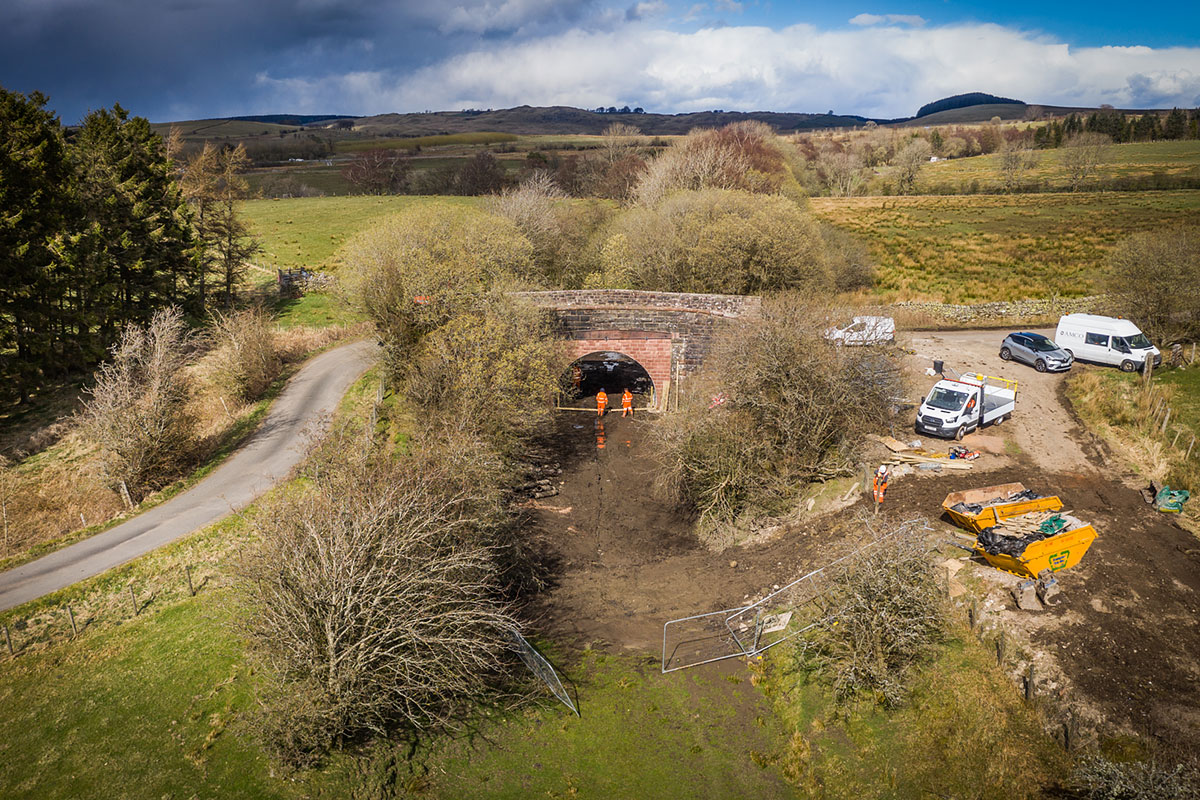
Contractor AMCO-Giffen progresses the partial infilling of a bridge on the former Penrith-Keswick branch in the Lake District which is the focus of a longstanding reopening campaign. The new arched opening is not big enough to accommodate a train.
PHOTO: THE HRE GROUP
Highways England’s own assessments and inspections demonstrate that the 134 structures earmarked for infilling or demolition present no meaningful risk to the public. There is no engineering, safety or financial justification for this programme of works - it is a policy decision, supported by a driving force within the Department for Transport.
In the spring of 2016, a paper was prepared for Highways England’s Board which reviewed the performance of the Historical Railways Estate (HRE) over the previous six months and proposed a Draft Strategic Plan (DSP) for the Estate’s future management. This Plan considered “how the current inspection based and reactive approach should be transformed to one that is more intervention based”, the aim being to “significantly reduce the level of liability and risk to the HE and DfT” by demolishing 10-15% of the Estate and infilling other structures.
Using standard costings for each type of intervention, the estimated cost of delivering the DSP was put at £370-560M. It was asserted that “there is no realistic prospect of improving the overall condition of the HRE” between 2015 and 2020 as HE’s budget for managing it during that period averaged £8.25M. However, in the summer of 2020, Highways England awarded framework contracts for HRE works to the value of £254M, covering the seven years to July 2027.
In a letter to Robbie Moore MP on 12 January 2021, the Minister of State for Transport, Chris Heaton-Harris MP, stated that “no decisions have yet been made as to the level of HRE funding” beyond 2021-22. It therefore remains unclear as to how Highways England felt able to award contracts to six companies involving average annual expenditure of £36.3M.
When news of its works programme was first revealed in January 2021, the company’s initial response was to assert that “Around 200 of the public road bridges managed by HE/HRE have failed their most recent structural assessment (BD21) but haven’t had any restrictions implemented. Therefore, our planned infilling is the safest and most appropriate option and will maintain access across the structure.”
Based on records sourced under the Freedom of Information Act, The HRE Group subsequently revealed that 55 of the bridges earmarked for infilling (48%) had not failed assessments, 24 (21%) were regarded by Highways England as being ‘fit for purpose’ and eight (7%) did have weight restrictions.
The company’s public position then changed, stating only that “We are acting to keep people safe from actual risks identified by experienced engineers who have had the benefit of inspecting the structures”. It went on to say that “Infilling or demolition is only considered when structures have been assessed as unsafe”.
The HRE Group challenged these statements, arguing that the majority of the threatened structures remain in ‘Fair’ condition, show no signs of distress/overloading and cannot legitimately be regarded as “unsafe” by any reasonable definition of the word.
Between December 2020 and February 2021, Highways England issued contracts for two demolitions and seven infilling schemes with average values of £125K for the demolitions and £191K for the infillings, although the latter figure is inflated by a single scheme of £439K in Scotland. The average otherwise is £149K.
Three of these schemes benefit from pre-existing planning permission; the remainder are being progressed after the relevant Local Planning Authority determined that the works constitute “repair” or Permitted Development, despite significant ecologicial, environmental, economic and sustainable transport impacts which would not therefore be scrutinised. This suggests that the programme is being driven by opportunism, rather than risk or condition concerns.
It should be noted that most Local Planning Authorities have made clear to Highways England that infilling and demolition schemes require planning permission.
About Us
The HRE Group is an alliance of walking, cycling and heritage campaigners, engineers and greenway developers who regard the Historical Railways Estate’s structures to be strategically valuable in the context of building a better future.
Last updated 24 July 2024
© 2024 The HRE Group


